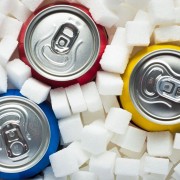Diet drinks may not be ‘diet’ after all
Diet drinks, while low in sugar, can have other unintended consequences, such as appetite stimulation, researchers argue

Artificially sweetened beverages, often referred to as diet-drinks, claim to be bring health benefits and aid in weight loss, but a paper published in the journal PLOS Medicine argues that there is no evidence to support such assertions. Far from a healthy alternative, these drinks may actually promote a chain reaction that leads to weight gain, obesity, and other weight-related issues. As a result of numerous studies showing a link between sugar-sweetened drinks and various diseases, such as cardiovascular failure, metabolic syndrome, diabetes and obesity, diet-drinks have become an increasingly popular alternative. But according to a commentary by researchers at Imperial College London and two universities in Brazil, diet drinks are now as much a part of the obesity problem as sugar-sweetened ones.
“A common perception, which may be influenced by industry marketing, is that because diet-drinks have no sugar they must be healthier and aid in weight loss when used as a substitute to full-sugar versions,” said Professor Christopher Millett, lead researcher at Imperial’s School of Public Health, in a report in The Guardian. The researchers explained that while diet-drinks are perceived as low in calories and sugar, they can also stimulate sweet taste receptors, increase appetite, and encourage excessive eating to compensate for the ‘low calorie count’.
“Since the blood sugar levels and insulin response with diet-drinks is not as high compared to consuming real sugar beverages, this will increase the body’s appetite, which simultaneously increases food intake,” Dr Raissa Edwina Djuanda, a Nutrionist at Hermina Jatinegara Hospital and Pondok Indah – Puri Indah Hospital in Jakarta, told Global Health and Travel (GHT).
But not everyone agrees with the study’s findings. Gavin Partington, director general of The British Soft Drinks Association took issue with the paper, arguing in The Guardian that, “Contrary to the claims, scientific research shows that low-calorie sweeteners, such as those found in diet-drinks, help consumers manage their weight as part of a calorie-controlled diet.”
The chief nutritionist at Public Health England, Dr Alison Tedstone, similarly argued that based on evidence reviews, swapping to low or no sugar drinks does in some way aid the management of calorie intake and weight. “However, maintaining a healthy weight takes more than just swapping one product for another. Calories consumed should match calories used, so looking at the whole diet is very important,” she said in a report in The Guardian.
If consumers are confused over conflicting claims, they can look to the World Health Organization, which recommends a daily intake of five to 10 percent sugar to maintain a healthy lifestyle. And since the long-term side effects of artificially sweetened drinks are still under study, Dr. Raissa suggests opting for healthier and natural sugar-sweetened beverages, like fresh juices, smoothies, or shakes instead.
This story was originally published in the Global Health and Travel issue of October 2017
Related Articles
WHO recommends reducing daily sugar intake by half
Limiting sugar consumption may help tackle obesity, says World Health Organization (WHO)
Read moreNew exercise burns calories even after workout
Orangetheory Fitness, based on “excess post exercise oxygen consumption” or Epoc, is the latest fitness phenomenon
Read moreDieters dependent on healthy food options
Study shows that food accessibility is just as important as personal determination in improving dietary intake
Read moreLatest Articles
Medical Care
Achieving Swift Recovery: Enhanced Recovery (ERAS) Direct Anterior Approach Total Hip Replacement
Consider total hip replacement with Alps Orthopaedic Centre's ERAS Direct Anterior Approach for faster recovery and reduced hospital stays. Learn about Dr. Jerry Chen's expertise in Singapore.
Read moreMedical Care
Enhanced Recovery (ERAS) Total Knee Replacement
Discover how Alps Orthopaedic Centre's Enhanced Recovery After Surgery (ERAS) approach transforms total knee replacement into a day surgery, offering faster recovery, less pain, and reduced hospital bills. Learn about Dr. Jerry Chen's expertise and schedule your appointment in Singapore.
Read moreMedical Care
Clinical Exercise Physiologist (CEP): The Emerging of Exercise is Medicine
How Exercising can be a Medicine
Read more